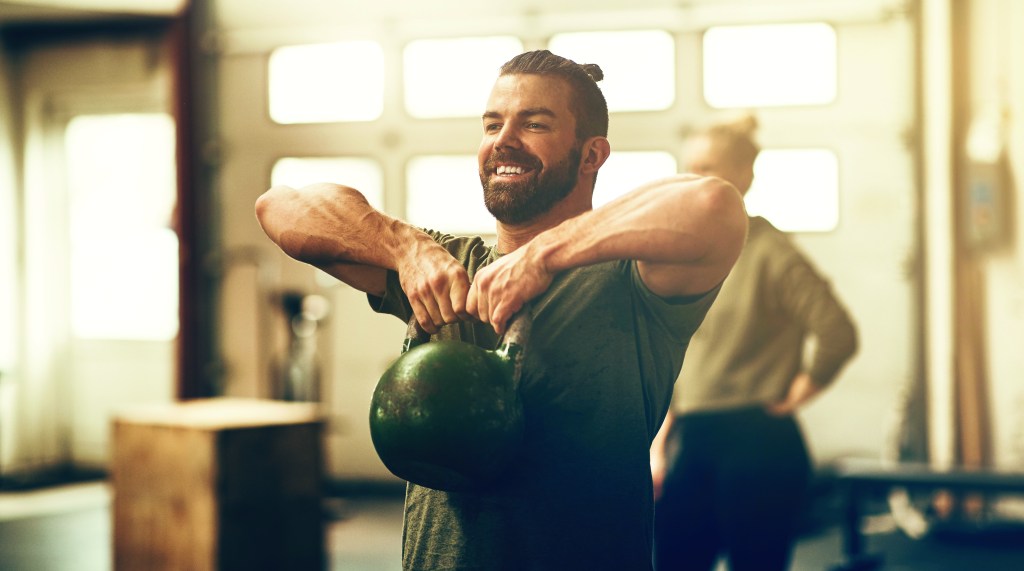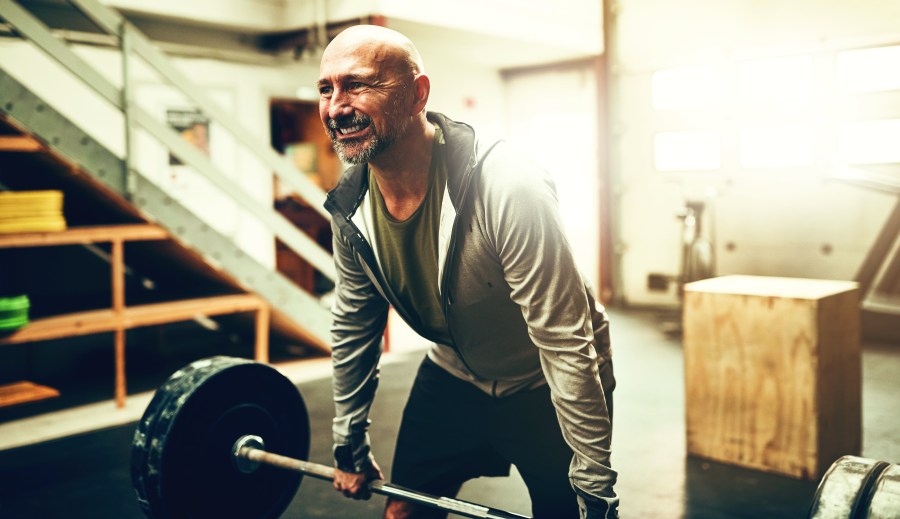A calmer mind and a stronger body? How lifting weights can boost your mental wellbeing as well as your body
When Josh Woodfin moved into his flat in Streatham, South London, he didn’t expect to become a full-blown weightlifting obsessive. By his own admission he had always fallen in and out of love with fitness.
“I played rugby for years and then had a long period of not doing much,” he says. “I was working for magazines and drinking a lot. I was carrying a lot of weight and wasn’t very happy. I’ve had issues with depression and anxiety and CBT and talking therapy have helped. But I was looking for a fitness thing and that’s where Squats came in.”
Squats is Woodfin’s local gym, an unprepossessing space next to a dentist and pharmacist on the kind of row of shops you’d walk past in the outer reaches of any major city. For Woodfin, though, going through its doors was a lifesaver.
And as his body started to change, so did his mind.
“You start being a lot more sympathetic with yourself,” he says, explaining how each lift can present a challenge but also how repeated movements can yield better results.
“I feel amazing afterwards,” he says. “I came away thinking, ‘If nothing else, I’ve done something positive today.’”
Resisting anxiety
The physical benefits of lifting weights are well known – increased strength, greater stamina and endurance and improvements in physique are the main drivers behind what has become a multi-billion pound industry.
What is less known is that hitting the iron on a regular basis has a positive impact on your mental health too, something Paolo Cunha knows all about. Cunha is a postdoctoral fellow at the Albert Einstein Jewish-Brazilian Institute of Education and Research (IIEPAE) in São Paulo, Brazil and also happens to be a keen weightlifter.
He has spent much of his time researching the hidden benefits of lifting and has found that the holistic benefits mean it’s something that those having a hard time should certainly consider trying.
“We found that resistance training is effective in improving depressive and anxiety symptoms in healthy older adults and those with mental health problems,” he says, speaking of a 2021 study which looked at how lifting could improve outcomes for those with mental health issues.

Similar research in Biological Research for Nursing, published in the same year, looked at 21 different studies and found positive outcomes from lifting weights for those struggling with depression.
Thanks to the results of his study, says Cunha, “…we can suggest that resistance training can be used either to prevent or treat depression and anxiety.
“The exact mechanisms of how exercise can improve mental health are still unclear, but we can speculate on some. Biological factors such as the reduction of some blood biomarkers and increases in some neurotransmitters such as serotonin, dopamine and brain-derived neurotrophic factor (BDNF) can positively influence people’s mental health.
In addition, improvement in physical capacity can be considered a big factor too, boosting confidence in the process.”
An idyllic place
Justin Quirk is an author and journalist who has covered this topic extensively, as well as being someone who has seen the direct mental health benefits of lifting weights.
“There’s a neurological and physiological element to it, which becomes very apparent when you first start because you’re kind of shocking your body,” he says. “You’re just like, ‘Oh my god. This is like someone’s unlocked another level.’ You feel very different.”
Quirk says there appear to be two facets to why lifting has such a powerful impact on mental wellbeing. Firstly, there’s the straightforward boost in dopamine and endorphins that you get from weights, the so-called ‘happy hormones’ that will keep you coming back for more.

“I find if I don’t do it for a couple of days I feel kind of lethargic and a bit grizzly,” he says. The simple act of going to the gym, even for a short session, makes him feel better.
Then, he says, there’s the fact that the gym is a space that is the opposite of an outside world that, these days, can feel impossible to navigate.
“Especially for young men, or all men, really, there’s so much of what you engage with in your day-to-day life, whether it’s jobs, money, the housing ladder, there’s a constant feeling that things are slightly rigged against you. Things can feel rigged towards those who’ve got money or contacts or had a leg up for their family.
“One of the things is that the gym is completely egalitarian. If you go in there and you just put the work in and you lift the iron, you will get the results, and you will get the results you deserve. It’s an almost idyllic place.”
Strength in numbers
It’s not just the act of lifting weights that gives the gym the mental wellbeing factor. It’s being among others striving for a similar goal, and from all walks of life, that can also help boost your mind as well as your body.
“The gym can provide an environment of great social interaction,” says Cunha. “Making new friends, and talking to different people, all of which can be important factors in improving your mental health.”
It’s something Woodfin believes too. When he first started at Squats, he was nervous that it would be an old-school establishment that wouldn’t be welcoming. That couldn’t have been further from the truth.
“The weightlifting is a conduit for the community,” he says. “Yes, we talk about weights, but then we also talk about film and other things besides.” He likens it to the rules for French supper clubs, where you can talk about anything other than politics or partners.
“I don’t have any of [the other gym-goers’] numbers, but you go from nodding terms to having a chat every morning, and that’s great.”
Quirk says the gym has also become a cornerstone of his social life, allowing him to connect properly with friends, something that is already known to boost mental health outcomes.
“I’ll get a train over to Muscle Works in Whitechapel [from his home in Middlesex]. I’ll meet a mate there at half seven on Saturday morning. Have a proper workout. Go and get breakfast – that’s a perfect start to a Saturday for me.”
He also believes that ‘proper weightlifting gyms’ such as Squats and Muscle Works offer greater human connection and a better social experience compared with upscale places and spas.
“I’ve never encountered any attitude, any aggression or what you would broadly call toxic masculinity in those environments,” he says.
“I have done in posh upscale gyms and I have done in spa hotel training places. But in actual proper lifting environments, no.”
Feel better
While that social aspect is essential, what sort of lifting moves should you be looking to do to give your mental health a good workout?
“Based on our results, the effects of band and body weight and exercises were not significant,” says Cunha. Instead, he says, it seems either using free weights or cable machines can have a positive impact. It doesn’t matter whether that’s dead lifts, chest presses or squats.
As long as you go and are consistent in your approach, you may find yourself feeling lighter, less anxious and less troubled with depressive symptoms.
That’s not, however, to say that you should totally discount bands or using your bodyweight.
“Some form of exercise is always better than doing nothing,” says Cunha. “So, if the only option is to use bands or body weight, do it.”
In the meantime, Cunha is working on a new project looking at how resistance training can boost sleep and cardiovascular health. When it comes to mental health though, the results are in. Get lifting and chances are you’ll feel better and not just look better.







